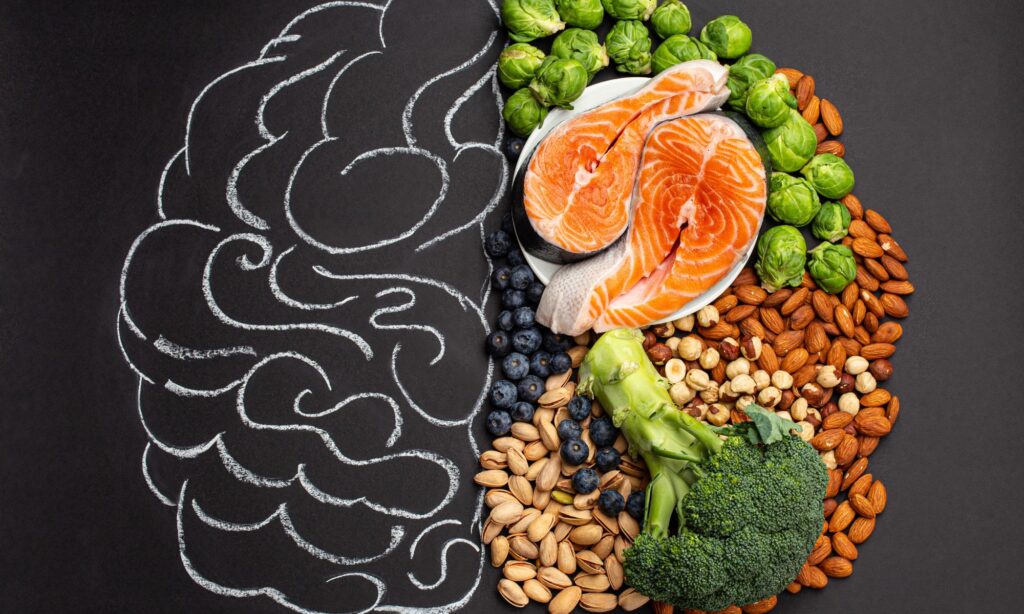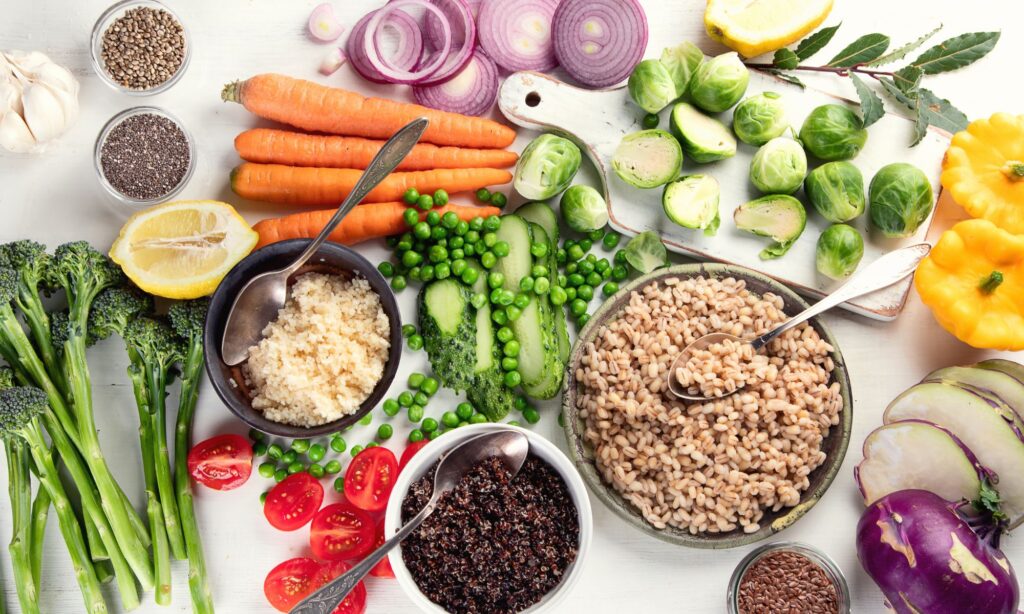Gut Health Matters: The Science Behind Food, Mood, and Focus

Table of Contents
Your Brain Feels What Your Gut Eats
We’ve all heard the phrase “gut feeling,” but it’s more than just intuition. Your gut and brain are in constant communication, influencing each other’s functions.
If you’ve ever felt foggy after a heavy meal, emotionally low after indulging in sweets, or anxious without a clear reason – it might be linked to your gut health.
The gut-brain connection is a powerful, science-backed reality that affects everything from your focus and motivation to your emotional resilience. Your brain can only function as clearly as your body allows, and what you eat plays a significant role in that equation.
This isn’t about perfection. It’s about recognising that your brain and gut are a team. And if you want to feel better, think clearer, and show up more powerfully in your life, your nutrition is a great place to start.
The Gut-Brain Axis, Explained Simply
Imagine a constant conversation happening between your gut and your brain, through nerves, hormones, and even immune signals. That’s the gut-brain axis. It’s not a metaphor; it’s a real, two-way communication system that scientists have studied extensively.
Here’s how it works:
- Your gut microbiome (the trillions of bacteria living in your intestines) produces neurotransmitters like serotonin and GABA, which influence mood and stress levels.
- When your gut is inflamed, sluggish, or out of balance, your brain picks up the signal, and you might feel anxious, down, or mentally tired.
- When your gut is nourished and balanced, your brain feels supported. You think better, regulate emotions more easily, and experience more stable energy.
Your gut isn’t just about digestion. It’s a major player in your mental well-being. And every bite you take is sending a signal up the chain.
I give you a personal example: Whenever I’m sick, my body starts craving for McDonald’s French fries, it’s the funniest thing. I guess because it’s plain and salty, my stomach finds it soothing or whatever. And of course, where there are fries, there’s Coke. And depending on the condition, I have this daily for a couple of days up to a week.
Now the problem I noticed is, whenever I continue this for too long, I notice my mood and mental well-being decreasing gradually. And the worse I feel, the more I crave junk food. It’s an endless spiral. And the reason is simple: I messed with my gut biome and have to fix it!
What Happens When Gut Health Takes a Hit?
Let’s face it: when life gets hectic, convenience often wins. You’re tired, hungry, and a microwave meal or sugary snack feels like the fastest way to feel better. Plus, over half of what lines supermarket shelves today is ultra-processed. And let’s not ignore the fact: not everyone has easy or affordable access to fresh, whole foods. But when this becomes your norm, your gut health begins to suffer, and so does your mind.
Highly processed foods, excess sugar, and regular alcohol intake can:
- Disrupt your gut microbiome that influences digestion, immunity, and even mood.
- Increase inflammation in the body and brain.
- Trigger blood sugar highs and crashes, leaving you drained, irritable, and craving more.
- Interfere with your sleep, energy, and hormonal balance.
In other words: they don’t just affect your digestion, they affect how you think, feel, and function.
You might notice:
- Brain fog or sluggish thinking
- Mood swings or emotional sensitivity
- Difficulty concentrating
- Low motivation or energy dips
This doesn’t mean you need to quit everything overnight. But if your mood, focus, and long-term health matter (and they do), making more intentional choices about what you eat can be a powerful first step.

How Nutrient-Rich Foods Support Your Brain and Mood
Just as junk food can drag you down, real food can lift you up. Whole, nutrient-dense meals don’t just feed your body, they feed your brain.
Certain nutrients are especially powerful when it comes to mood and mental clarity:
- Omega-3 fatty acids (from fish, walnuts, flaxseeds) reduce inflammation and support emotional stability.
- Magnesium (in leafy greens, seeds, dark chocolate) helps with anxiety and sleep.
- Fibre (in fruits, veggies, whole grains) supports a healthy microbiome.
- B vitamins (found in whole grains, legumes, eggs) are essential for energy and cognitive function.
Think of your meals as brain fuel. The more you nourish your gut health, the more support your mind has to function clearly and consistently.
The Gut Biome and Serotonin: What You Need to Know
Here’s a mind-blowing fact: about 90% of your body’s serotonin is produced in the gut. That’s the neurotransmitter most closely tied to mood regulation, emotional resilience, and even sleep.
When your gut is healthy and balanced, serotonin production runs smoothly. But when your gut is out of balance – due to stress, antibiotics, poor diet, or alcohol – serotonin levels can drop, leading to mood instability and low energy.
Taking care of your gut health is one of the most effective ways to support your emotional baseline. You don’t need supplements or trendy biohacks, you just need to eat in a way that supports the bacteria working behind the scenes.

What Exactly Is Processed Food?
Not all processing is bad. Technically, even washing, freezing, or chopping food is a form of processing. But when we talk about processed food in the context of gut health and wellbeing, we’re usually referring to ultra-processed food – the kind that’s been altered far from its original form and packed with additives.
Ultra-processed foods often contain:
- Artificial flavours, colours, or preservatives
- Added sugars or sweeteners
- Unhealthy fats (like hydrogenated oils)
- Refined grains stripped of fibre and nutrients
- Emulsifiers or stabilisers that affect gut bacteria
Think: crisps, biscuits, instant noodles, frozen pizza, flavoured yoghurts, packaged pastries, soft drinks, and many ready-to-eat meals.
These products are designed to be hyper-palatable and shelf-stable – not for your gut health. And the more your diet leans on these foods, the more strain you put on your digestive system, blood sugar balance, and mental clarity (not to forget the general health aspects which I don’t want to get into here).
Simple Swaps and First Steps to Upgrade Your Nutrition
You don’t have to overhaul your whole life to start feeling better. Start small. Start smart. Here are some doable upgrades that make a real difference:
- Swap sugary cereal for oats with berries and nuts.
- Replace soda with sparkling water or herbal tea.
- Add a handful of greens or sauerkraut to your lunch.
- Try cooking one homemade meal a day, even if it’s simple.
- Take a short walk after meals to support digestion.
Consistency > Perfection. Every nourishing choice tells your brain: “I’ve got your back.”

Recommended Books on Nutrition for Brain and Mood
If you’re curious about how food impacts your mental health, focus, and emotional well-being, these expert-written books offer both scientific insights and practical advice. From gut bacteria to dietary patterns, each title explores the powerful connection between what you eat and how you feel, mentally and emotionally.
1. The Mind-Gut Connection, by Dr. Emeran Mayer
A fascinating look at how the gut and brain communicate. Dr. Mayer unpacks the science behind the gut-brain axis and offers guidance on improving digestion, managing stress, and supporting emotional balance through diet and lifestyle.
2. This Is Your Brain on Food, by Uma Naidoo, MD
Written by a nutritional psychiatrist, this book explores how specific foods affect mental health symptoms like anxiety, depression, brain fog, and more. It’s a practical guide packed with food suggestions, recipes, and powerful insights into the mind–food connection.
3. Brain Maker, by Dr. David Perlmutter
An eye-opening exploration of how gut bacteria shape brain health. Dr. Perlmutter explains how altering your microbiome can positively affect mood, memory, and neurological conditions, and offers a food-based approach to healing.
4. Eat to Beat Depression and Anxiety, by Drew Ramsey, MD
This book offers a down-to-earth, science-backed plan for supporting your mental health through nutrition. With easy recipes and shopping tips, it empowers you to make food choices that nourish both brain and mood.
5. The Good Gut, by Justin, and Erica Sonnenburg
Written by Stanford microbiome researchers, this book reveals how everyday diet choices shape your gut, and in turn, your brain. It’s a balanced blend of research, relatable storytelling, and long-term strategies to improve both physical and emotional health.
6. The Glucose Revolution, by Jessie Inchauspé
While it doesn’t focus specifically on the gut-brain axis, this accessible, research-backed book shows how balancing your blood sugar can transform your mood, focus, and energy. It’s a must-read if you’ve ever struggled with cravings, crashes, or emotional ups and downs tied to food. My husband and I discovered it recently and just LOVED it!
Disclaimer: As an Amazon Associate I earn from qualifying purchases.
Conclusion: You Can’t Think Clearly If Your Brain Is Inflamed and Exhausted
Let’s stop acting like our brains are separate from our bodies. If you’re chasing big dreams, leading others, or just trying to feel like yourself again – start with your gut health.
The way you eat shapes your focus, your mood, your resilience, and your clarity. When your gut is healthy, your brain has the resources it needs to be steady, sharp, and strong.
Food is more than fuel. It’s communication. And every meal is a chance to send your brain a message of support.
Gut health is not the only thing to take care of to improve your mental focus and performance. Read about the mind-body connection to learn about all areas of your life you need to take care of.
FAQs
How does gut health affect my mood?
Your gut microbiome produces neurotransmitters like serotonin and GABA, which influence mood and anxiety. A healthy gut supports emotional stability, while an imbalanced one can lead to mood swings, brain fog, or irritability.
Can eating poorly really cause anxiety or depression?
Yes. Diets high in processed foods, sugar, and alcohol can cause inflammation, which affects brain function and emotional regulation. This can increase the risk of anxiety, depression, and low energy.
What are some signs my gut health might be off?
Frequent bloating, fatigue, mood changes, brain fog, and sugar cravings can all point to a gut imbalance. Chronic stress and poor sleep can also impact your gut health.
How long does it take to notice improvements after changing my diet?
Some people notice changes in energy, focus, and mood within a week. Gut healing is gradual, so consistency over several weeks or months leads to more lasting improvements.
Do probiotics help with mental health?
Some research shows that certain probiotic strains may support mood and reduce symptoms of anxiety and depression. However, food-based support through fibre, fermented foods, and diversity in the diet is also crucial.







